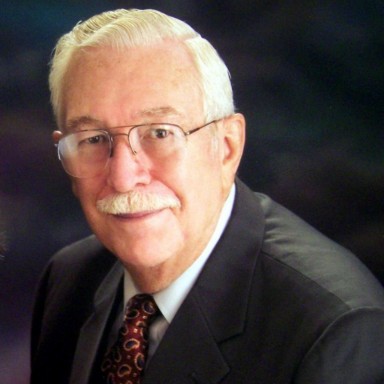Date of interview: 23 September 2017
Captain Richard Marcott finished his Coast Guard career in 1986 as the commanding officer of a major training center where 2000 young enlisted men and women a year learned technical petty officer skills. Previously, he had designed the leadership training program for the entire Coast Guard and was the first Coast Guardsman to teach at the National Defense University. Like many in the service, his career was launched by the desire to get an education and see the world beyond his small hometown in Western Pennsylvania.
His military career began when he accepted an appointment to the Coast Guard Academy in 1953. In his first book, “A View from the Rigging: Memoirs of a Coast Guard Career,” Marcott details his indoctrination at the academy, sailing the tall ship Eagle to Europe, Panama, the Caribbean, and pre-Castro Cuba, where cadets attended a swank party at the home of the American ambassador and had a run-in with Ernest Hemingway. His early career included harrowing sea rescues, boarding Jacques Cousteau’s exploration vessel Calypso and wry stories of training missions gone slightly amiss. A year as the commanding officer of an electronic navigation station in Okinawa, Japan, left him with charming stories of cultural differences.
In mid-career, he served as the executive officer on the cutter Resolute, which patrolled the Bering Sea to enforce fishing treaties. Marcott learned of the moon landing from Russians while boarding their vessel and survived vodka-laden meetings with his communist counterparts. He later was commanding officer of the cutter Chilula.
Marcott capitalized on his extensive service experience in training assignments as he transitioned into the civilian world at the Bank of America and the University of Pittsburgh at Bradford. He returned to his hometown of Bradford, Pa., where he lives with his wife of 59 years, Carol, and enjoys time with his daughter, Kimberly, and her family. He published “A View from the Rigging” when he was 81.
MWSA: What do you think are the main benefits of being an MWSA member?
Richard Marcott: I feel validated as an writer/author. Excellent feedback from relatives and friends, while nice, is not the same as being selected for an award by a national organization of professional writers. I am absolutely encouraged to continue writing.
MWSA: What prompted you to write your memoirs?
Richard Marcott: I had been fortunate to have a number if interesting assignments that lent themselves to great stories. I admit I love telling stories. After hearing them many times, my daughter kept prodding me to ""write those stories down for the grandchildren."" I suspect many memoirists start that way.
MWSA: What was your process?
Richard Marcott: I worked at this for nearly six years. Of course, that included considerable time to learn how to write. I took a writing course at the University of Pittsburgh at Bradford that introduced me to creative nonfiction. The campus literary magazine published my first story, which was about a sea rescue. I was hooked. I did not start to write a book, but wrote one story at a time. After a few years, I began to see how they could evolve into a book.
MWSA: How have people reacted to your book?
Richard Marcott: I am surprised at the number of readers who have written me a letter or sent an e-mail to comment on my stories. Complete strangers, and members of all branches of services have had experiences similar to mine. When they tell me that my book prompted them to sit as a family and share their stories--I have to feel good about that. There were quite a few people, too, who had no connection to the military world who said they were fascinated by it. That surprised me.
MWSA: Were any stories harder to write than others?
Richard Marcott: Most of them were lighthearted and fun to write, but there were specific scenes that writing made me relive a moment that was painful. One was about a day trip my dad took with me when I commanded a rescue cutter, and I could see how proud he was of me. It made me miss him again. Another was when we nearly lost our infant daughter in surgery. That was a tough day to remember.
MWSA: Did you do much research?
Richard Marcott: Yes. A lot of people ask me, How did you remember that?"" Sometimes I didn't. I wanted to be accurate and researched a lot of details. Train schedules, history of commercial jet flights, routes and mileage between cities, historical dates, that sort of thing. Also old post card photos of our honeymoon motel, and yearbook photos. I made every effort to be accurate. Research enabled me to be more descriptive.

